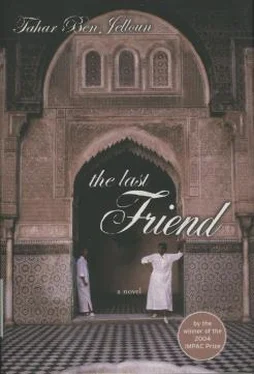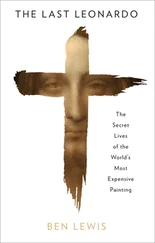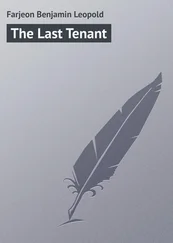I learned the language, and I was proud to be able to watch Bergman films without subtitles. I took advantage of Sweden's location to visit neighboring countries. I had a particular fondness for Denmark. Everywhere I went, I encountered fellow Moroccans, some of whom were lost souls, others political exiles, still others who had simply come to work and make their lives in that part of the world. They all told me the same thing. They missed Morocco, even if they had suffered there. It's strange, this strong, neurotic relationship we have with our homeland. I needed to come back here to die.
Perhaps it's because of our cemeteries. The tombs are arranged any which way. No one minds the chaos. Children offer to water the grass on the tomb you have come to visit. Old peasants read verses from the Koran so quickly that they swallow half their words, in order to make ten dirhams from a mourner. Our cemeteries are part of nature. They are not sad places. If you could see the one in Stockholm! Sterile, orderly, depressing. Of course, many Scandinavians choose to be cremated. Muslims don't do that. To be reduced to a little pile of ashes, put in a box, then scattered to the wind— how romantic! To think that we return to the earth to fertilize it, and become reincarnated in a plant or a flower. We never talked about this. Do you remember when you went through your atheist phase? You told me you would try to
give your children tree or flower names, instead of Islamic ones. You rejected any religious references. After a while, you let go of this rigidity. You replaced it with another: you didn't accept social hypocrisy. We agreed on what was essential. You made me laugh because you searched for perfection in people. You didn't say it quite that way, but you were surprised when someone didn't keep his word, or when you caught someone in a lie.
I liked your relationship with women. I had settled down. I nurtured my relationship with the beautiful Ghita. I no longer seduced other women. But women were your weakness. An evening without a woman was a failure. A trip wasn't memorable unless you met a new woman. I was astonished when you told me you were getting married. You wanted to join the ranks of married men to be like me, to have both the stability and tensions of married life. We both had marital problems. Neither of our wives ever really accepted our friendship. We stole from them time we should have been spending with them. What you and I shared was spiritual. With our wives, it was sensual above all else.
Thirty years with some eclipses, some moments of silence, some separation due to travel. There were moments that gave us pause, but there were never any doubts. We never called our friendship into question. We always met again with the same gaze, the same strong sense of each other. People thought we agreed on everything. In fact, what gave depth to our relationship was precisely the opposite: it was
our different perspectives, our differences of opinion, freely expressed, but without any kind of personal opposition between us. We complemented each other and defended the force that cemented our bond.
I have found our rupture hard to endure. Many times, I almost flew back to Tangier to tell you what I had done. I never had the courage, and then it was too late. I believed in my decision, and I couldn't take it back. When I seemed to be angry with you, talking about the bills for the apartment, I worked hard to be believable, using all my talents as an actor to pull it off. I needed the strength of my conviction.
Now, I return to you your due. Our friendship was a great and beautiful adventure. It does not end with my death. It remains a part of the life you will continue to live.
Mohammed
Tangier, Morocco, July 2003—January 2004












